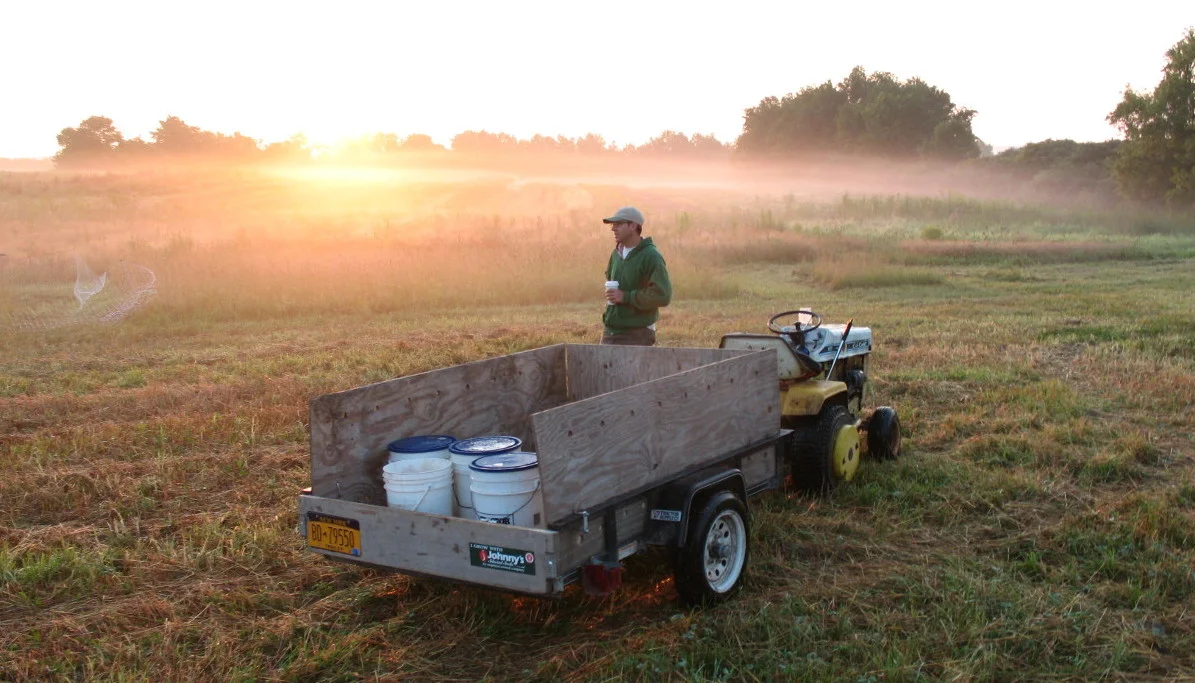Walking a Mile in Others’ Muck Boots—Farmer Dramas and Impostor Syndrome
/It’s January, which means it’s the season of farm conferences. In this pandemic year, it’s the season of a LOT more farm conferences than the one or two events we normally would attend in person, since all education is now online.
My monthly calendar looks like I’m back in school, with at least one class three or four days a week for the next couple months. Wherever I am on the farm, if I’m within Wi-Fi range and have my headphones on, I’m probably listening to a webinar.
One thing that I love about being farming is this sheer bulk of information we need to process, and the different things we can tweak to be just a little bit better. Every year, we use language and science, biology, geometry, chemistry, marketing, financing, graphic designing, accounting computer programing, and a truly staggering amount of algebra. (Seriously, diversified vegetable farms are algebraic machines—if you have x members who get 3 cucumbers a week and y members who get 4 cukes a week, and you get 2 cucumbers a foot for three weeks from one planting, calculate how many feet of cucumbers you need to guarantee 8 weeks of adequate member cucumberization…)
No cukes, but tons of other algebraically derived peak summer veggies!
It’s been one bright light this gloomy winter to have the chance to refresh old ideas and hear from farmers with new research—even if we just learn just one new thing from a two-hour class, that can really help us get better food from our farm to our members. So far, I’ve learned a new member database system (with free software to boot!), alternative long-term storage strategies for keeping winter squash, and that we can store a wider range of crops for winter (radicchio and cauliflower, I’m gunning for you!).
Yet it’s also been frustrating to hear a bit of the absolutism that seems to reign now from our veggie fields up into government and industry.
Just like in the bigger world, us farmers get into hot dramas. (Bet you non-farmers didn’t know that!)
And maybe ours are even more intense than “normal” drama, because we’ve got opinions and they have ample time to germinate and grow/fester as we drive our tractors, push hoes, or wash carrots stuck alone in our own minds. I have seen people almost come to fistfights over soil management, watched dozens of arguments about pesticide use, seen friendships break up over grazing management (as well as two marriages end building greenhouses), and personally been told what a lousy farmer I am way too many times to count. I have a friend out of the dairy industry who swears it’s only us vegetable farmers that have drama—her theory being that we northern plant growers have too much darn time in the winter to stew, unlike the dairy farmers that wake up at 4am *every* day, and are constantly too tired to argue!
Rutabagas ain’t got no drama! We are excessively successful at long term rutabaga storage—let us know if you have a hankering!
I wanted to write this particular blog as a boost to the other smaller farmers out there, as well as all you home gardeners, homesteaders, and backyard gardening wannabes, to encourage us all to work within our own systems and constraints and learn what works best for the land we are working with—which may not be what works best for others’ land! As a gardener/farmer, you are in the process of becoming the number one expert on your site, and your learned experience will give you guidance to help figure out your way of growing.
Because in farming, there is not one right way to do things, but rather a set of myriad possible paths that might fit your land, time, and financial needs. For some of us, that could be no till and deep soft beds tucked in every winter under 12 inches of leaves. For others of us, that might be growing in pots or plant protection under tunnels and greenhouses (pro-farmer tip for fellow Fenner-ins—leaves don’t stay where you put them up here!).
We farm outside of Syracuse, NY on the north edge of the Allegany plateau. It’s the northern end of hundreds of miles of hilly, rising high ground that sweeps up from the Appalachians and Pennsylvania, before dropping 1300 feet to the Great Lake plain half a mile north of our farm. It’s beautiful and green and rolling up here—a big sky filled with swirling clouds, roiling with winds coursing around and over or slapping against that escarpment.
Fenner does skies well (well, when we can see the sky through the snow these days).
Vegetable farming in Fenner is hard as heck. Because we are extra crazy (or maybe not that smart?), we are organic farmers, which makes things even harder. We couldn’t produce on our commercial scale if we weren’t darn good farmers. But some days (or seasons) the very act of trying to grow vegetables up here feels like we’re slamming our heads pointlessly against the wall.
In order to guarantee our CSA members and customers a high-quality product, we do use practices that I’d skip if I was growing in other, more mild conditions. We have high tunnels and row covers, and use some plastic mulches to keep our ground temperatures up, while minimizing soil compaction from the extreme rains of recent years. We rotate fields, try to keep our ground covered (even if only with plastic sheeting), plant soil building cover crops, and encourage air flow and healthy plants. And with all these steps, our land and the effectiveness of our farm systems are slowly but steadily growing better each year.
And yet, even against the lens of that slow success (and knowing that just by surviving as a small farm these days is a success), I am constantly doubting myself, especially when I weigh our farm against growers in more mild climates. (There’s that darn impostor syndrome!)
This is not even a scary cloud for us. Scary clouds are spinning or would already be smashing all the tender veggies up with hail by this point!
We get asked endlessly about expansion and doubling our CSA and growing wholesale. Most times it’s helpful suggestions of people that want to work with us or see us do more or reach more markets. This last year some of those asks were more in the upset range, after we ran out of capacity so quickly to sell any more CSA shares.
Our truth is that we are good enough farmers to know our limits. Sure, maybe we dream too small. Maybe we should go back and manage farms on better land for someone else.
But there’s also such appeal of learning to do something hard and becoming good at it, because sometimes life is hard, and it would be good if we are able to grow local food for community futures in all regions (even our windy, extreme one).
I like the constant learning and challenge of evolving the farm systems as new technology and research comes online. I appreciate how the internet and greater connectivity helps communities that have been growing much longer on this continent share how they manage and adapt. There’s so much to learn and try out there, with eons of agricultural systems already tested and continually being re-tested, that it seems a poor plan to get stuck in one immutable this-is-how-thee-must-grow system.
And I also feel like there’s lots to learn from farms like ours, growers that are plunked down onto the more challenging spots but who still make things work. These past two years, the weather for much of the eastern US was lousy. The weather for us on the escarpments of Syracuse was “normal,” in that it was also lousy, but within our expected range of weather. This isn’t to say we don’t struggle or aren’t terrified of hail and windstorms, but that we are used to those challenges. Our farm systems are set up to operate a commercial organic vegetable operation knowing that we will likely get 4 inches of rain in an hour, 60mph winds (and weeks of 20mph standard breezes), and either eight weeks of daily rain or not a drop of rain. Drought, heat waves, never cracking 80, going from 30 to 90 in a week, heavy snow in mid-May? Been there, done that.
So this is my call for all us farmers and gardeners—to feel more confident in how we grow on our spots, to feel open to constantly learning and questioning and seeking new ways, but to not be judge-y about others who are finding their own ways.
Do you have some farm or garden tactics that you don’t having to use, but really make a difference on your site? What are your favorite farming education resources? I’m partial to NOFA-NY (their conference is running this week) and Cornell Small Farms. And we are always happy to talk with farmers trying to learn how to deal with wind (our specialty!)
Another perfect day in this drought summer (we LOVE dry summers here), where Princess Peapod cruises for shade.






